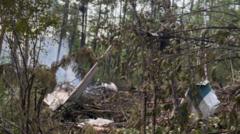In response to the recent tragic crash of Air India flight AI171, chairman N Chandrasekaran clarified that one engine was new and the other was not due for servicing until later. This announcement comes as investigations into the crash continue, revealing complexities surrounding aircraft safety.
Air India Assures Engine Safety Following AI171 Tragedy

Air India Assures Engine Safety Following AI171 Tragedy
The airline's chairman confirms engine histories as investigators delve into crash details.
The crash of Air India flight AI171, a Boeing 787-8 Dreamliner, which occurred shortly after takeoff from Ahmedabad airport, has raised pressing questions regarding the aircraft's engine safety. N Chandrasekaran, chairman of Air India, reported that one of the engines was brand new, having been installed in March 2025, while the other engine had a scheduled maintenance check set for December 2025. In an interview with Times Now, he emphasized that both engines had “clean” maintenance histories.
Tragically, the crash, which resulted in the loss of around 270 lives, has prompted an intensive investigation into the aircraft's final moments. Investigators are analyzing wreckage and flight data from black boxes which were recovered. "I caution everyone against jumping to conclusions," Chandrasekaran stated, reassuring the public that upcoming analysis of the flight recorders would clarify the situation.
Experts such as Kishore Chinta, a former investigator with India's Aircraft Accident Investigation Bureau, have commented on the complexities of engine diagnostics. According to Chinta, the age of the engines, particularly the Genx-1B engines used in the Dreamliner, does not directly correlate to their operational health. These engines utilize advanced monitoring technology known as Full Authority Digital Engine Control (FADEC), which continuously assesses engine performance and health, determining replacement needs based on real-time data rather than fixed schedules.
As investigations proceed, Air India's response involves scaling back international operations by 15% on wide-body aircraft until mid-July, in light of heightened safety protocols and personnel caution. Inspections have been conducted on 26 of its 33 Boeing 787 aircraft, all of which have been cleared for service. Remaining aircraft are undergoing checks to comply with directives from India’s aviation regulators for additional safety measures.
The crash's aftermath has significant implications for Air India's broader operational ambitions, particularly as it transitions from state-owned status to private ownership under Tata Sons, which acquired the airline in 2022. The management acknowledges that the situation is challenging yet necessary as they navigate a turbulent time for operations in a historically significant airline.




















